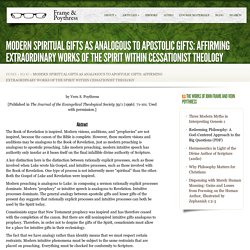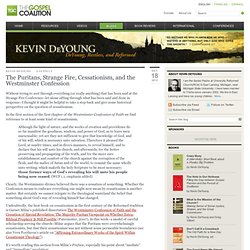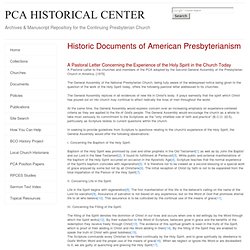

Modern Spiritual Gifts as Analogous to Apostolic Gifts: Affirming Extraordinary Works of the Spirit within Cessationist Theology. By Vern S.

Poythress [Published in The Journal of the Evangelical Theological Society 39/1 (1996): 71-101. Used with permission.] The Book of Revelation is inspired. Modern visions, auditions, and “prophecies” are not inspired, because the canon of the Bible is complete. A key distinction here is the distinction between rationally explicit processes, such as those involved when Luke wrote his Gospel, and intuitive processes, such as those involved with the Book of Revelation. Modern preaching is analogous to Luke: in composing a sermon rationally explicit processes dominate. Cessationists argue that New Testament prophecy was inspired and has therefore ceased with the completion of the canon. The fact that we have analogy rather than identity means that we must respect certain restraints. I maintain that modern spiritual gifts are analogous to but not identical with the divinely authoritative gifts exercised by the apostles. To develop this view we need several crucial distinctions.
Modern Spiritual Gifts as Analogous to Apostolic Gifts: Affirming Extraordinary Works of the Spirit within Cessationist Theology. A Debate on the Continuation of Prophecy. The Puritans, Strange Fire, Cessationism, and the Westminster Confession. Without trying to sort through everything (or really anything) that has been said at the Strange Fire Conference–let alone sifting through what has been said and done in response–I thought it might be helpful to take a step back and give some historical perspective on the question of cessationism.

In the first section of the first chapter of the Westminster Confession of Faith we find reference to at least some kind of cessationism. Although the light of nature, and the works of creation and providence do so far manifest the goodness, wisdom, and power of God, as to leave men unexcusable; yet are they not sufficient to give that knowledge of God, and of his will, which is necessary unto salvation.
Clearly, the Westminster divines believed there was a cessation of something. Whether the Confession means to embrace everything one might now mean by cessationism is another matter. A little later, Milne summarizes his thesis: Copyright © 2014 by the author listed above. PCA Historical Center: PCA Pastoral Letter on the Expeience of the Holy Spirit in the Church Today. Historic Documents of American Presbyterianism A Pastoral Letter Concerning the Experience of the Holy Spirit in the Church Today A Pastoral Letter to the churches and members of the PCA adopted by the Second General Assembly of the Presbyterian Church in America. [1975] The General Assembly of the National Presbyterian Church, being fully aware of the widespread notice being given to the question of the work of the Holy Spirit today, offers the following pastoral letter addressed to its churches: The General Assembly rejoices in all evidences of new life in Christ's body.

It prays earnestly that the spirit which Christ has poured out on His church may continue to affect radically the lives of men throughout the world. At the same time, the General Assembly would express concern over an increasing emphasis on experience-centered criteria as they are applied to the life of God's people. I. II. Life in the Spirit begins with regeneration[8]. III. IV. A. 1. B. 1. . [3]Acts 2:16-21.